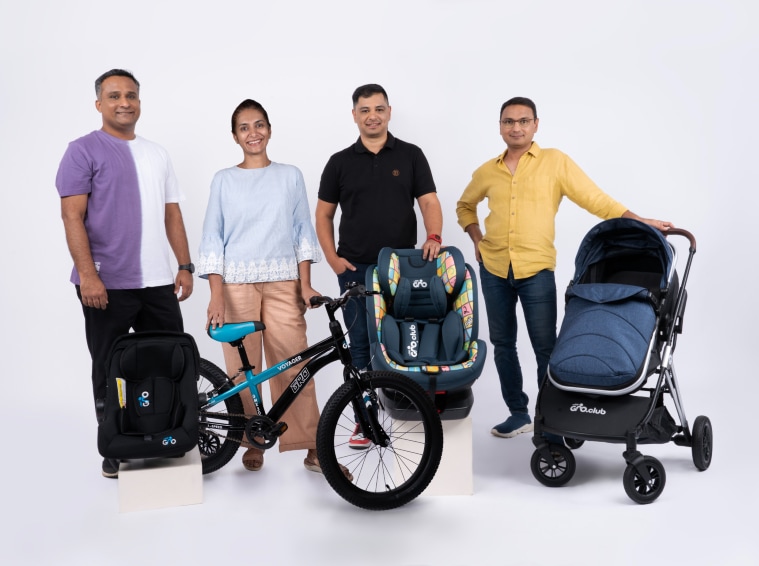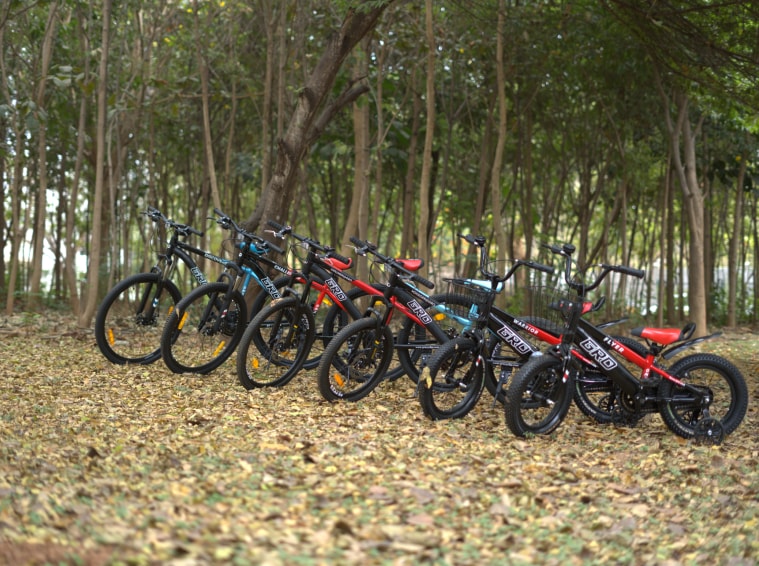“Our kids go through a behavioural and physical transformation so whatever the products you buy, they literally outgrow them in a span of six months or one year. That puts pressure on us parents to buy new products for them, leaving a trail of single-use products,” Pruthvi Gowda, Co-founder and CEO of Gro Club, explains how he hit up the idea of building a bicycle subscription platform aimed at kids in India.
“We want to change the traditional thought process of buying a bicycle for kids,” Gowda tells indianexpress.com in an interview. “When you already know that your kid is going to outgrow this product in the next 12 months to 15 months, why can’t you just subscribe or rent a product instead,” he reasoned.

Gowda, who started Gro Club along with Roopesh Shah, Hrishikesh Halekote Shivanna and Sapna in early 2022, says he wants to change how bicycles are being bought in India. “A product like a bicycle is designed to last about 10 years but since the kid has stopped using it, it will lie in one corner of the house for the longest time possible and eventually end up in a landfill,” Gowda explains, adding how getting a bicycle on a subscription-basis not only saves money but is also environment friendly.
 Gro Club founders Hrishikesh, Sapna, Pruthvi and Roopesh (Left to Right). (Image credit: Gro Club)
Gro Club founders Hrishikesh, Sapna, Pruthvi and Roopesh (Left to Right). (Image credit: Gro Club)
Bicycles can be expected to last anywhere up to 10 years depending on how they are used and maintained. Gowda’s Gro Club is taking the route of refurbishing existing bicycles they offer and bringing them back into circulation. Gowda says for the most part, this approach drastically cuts the energy to manufacture a new bicycle, thus reducing the carbon footprint.
“We are making one product for five customers,” he says, unlike the traditional approach where the thought process is to manufacture one product for one customer. Gowda says there is a need to embrace the concept of the circular economy to reduce waste, and make products that last longer. When done right, young startups like Gro Club can reduce waste and bet on new business models.
After two years of a new subscription, the chances are the child will outgrow the bike, Gowda says, adding this is when they bring the product back, refurbish it and reintroduce it in the market.
“There are so many products which can be refurbished from time to time, but we don’t do it because we don’t carry the mindset,” he says.
Story continues below this ad
Though very a familiar product, few experiments are being done, at least in India, to sell bicycles differently. Gowda estimates that over 20 million bicycles were sold in India in 2021. With an estimated market size of $2.7 billion, Gowda says there is a scope to scale the business if you have the right product.
 Gowda’s Gro Club is taking the route of refurbishing existing bicycles they offer and bringing them back into circulation. (Image credit: Gro Club)
Gowda’s Gro Club is taking the route of refurbishing existing bicycles they offer and bringing them back into circulation. (Image credit: Gro Club)
“A bicycle is a product which is loved by everyone irrespective of income group,” he says, adding that kids between two and 15 years are the biggest target group for bicycles.
Although more Indians are buying bicycles online, Gowda believes the delivery model hasn’t changed and the lack of branded tiers limit consumers’ choice. But the model Gowda is introducing in the market will give consumers the option to upgrade to a new bicycle for a certain period without purchasing, further pushing towards subscription services as a whole. The service would allow customers to buy a bicycle through monthly payments, similar to how users currently subscribe to Apple Music or Google Drive.
Gro Club offers bicycles in different sizes depending on the age group. The company caters to kids and teens aged between 2 and 15. Meanwhile, subscription pricing ranges from Rs 250 to Rs 699 on a monthly basis which includes doorstep delivery, customer support, maintenance and free upgrade. According to Gowda, the subscription tier that caters to the ages 2 and 6 is the most popular plan. In fact, 40 per cent of Gro Club customers belong to this age group.
Story continues below this ad
Since its inception, the platform claims to have onboarded around 5,100 active subscribers in Bengaluru with approximately 45 per cent of subscribers hailing from the ‘aspirational’ class. As of now, Gro Club offers its services only in Bengaluru but Gowda says they are exploring Hyderabad, Mumbai and Pune as the next possible markets for expansion.
Gowda’s Gro Club recently raised Rs 4.3 crore in a funding round at a valuation of Rs 25 crore. The round was led by Ramaiah Evolute, a startup wing of MS Ramaiah Group.
“We are in the space of kids,” Gowda says when asked about its plans to enter the e-bicycle segment. “They [kids] will start developing an affinity for e-bikes when they are above 10 years of age. Our goal is to build an ecosystem of different products with a specific age category that kids use.”’



 Gro Club founders Hrishikesh, Sapna, Pruthvi and Roopesh (Left to Right). (Image credit: Gro Club)
Gro Club founders Hrishikesh, Sapna, Pruthvi and Roopesh (Left to Right). (Image credit: Gro Club) Gowda’s Gro Club is taking the route of refurbishing existing bicycles they offer and bringing them back into circulation. (Image credit: Gro Club)
Gowda’s Gro Club is taking the route of refurbishing existing bicycles they offer and bringing them back into circulation. (Image credit: Gro Club)





